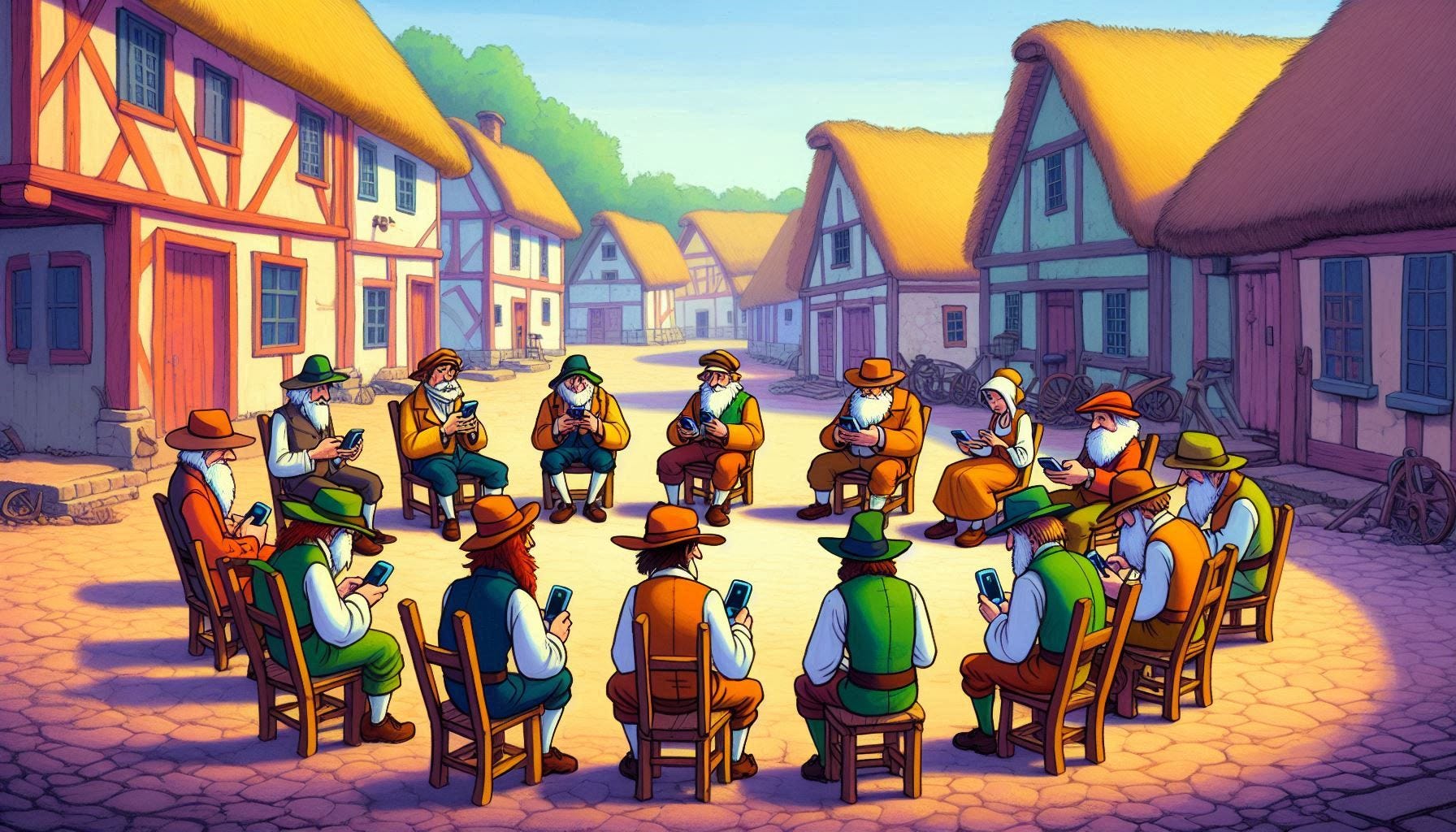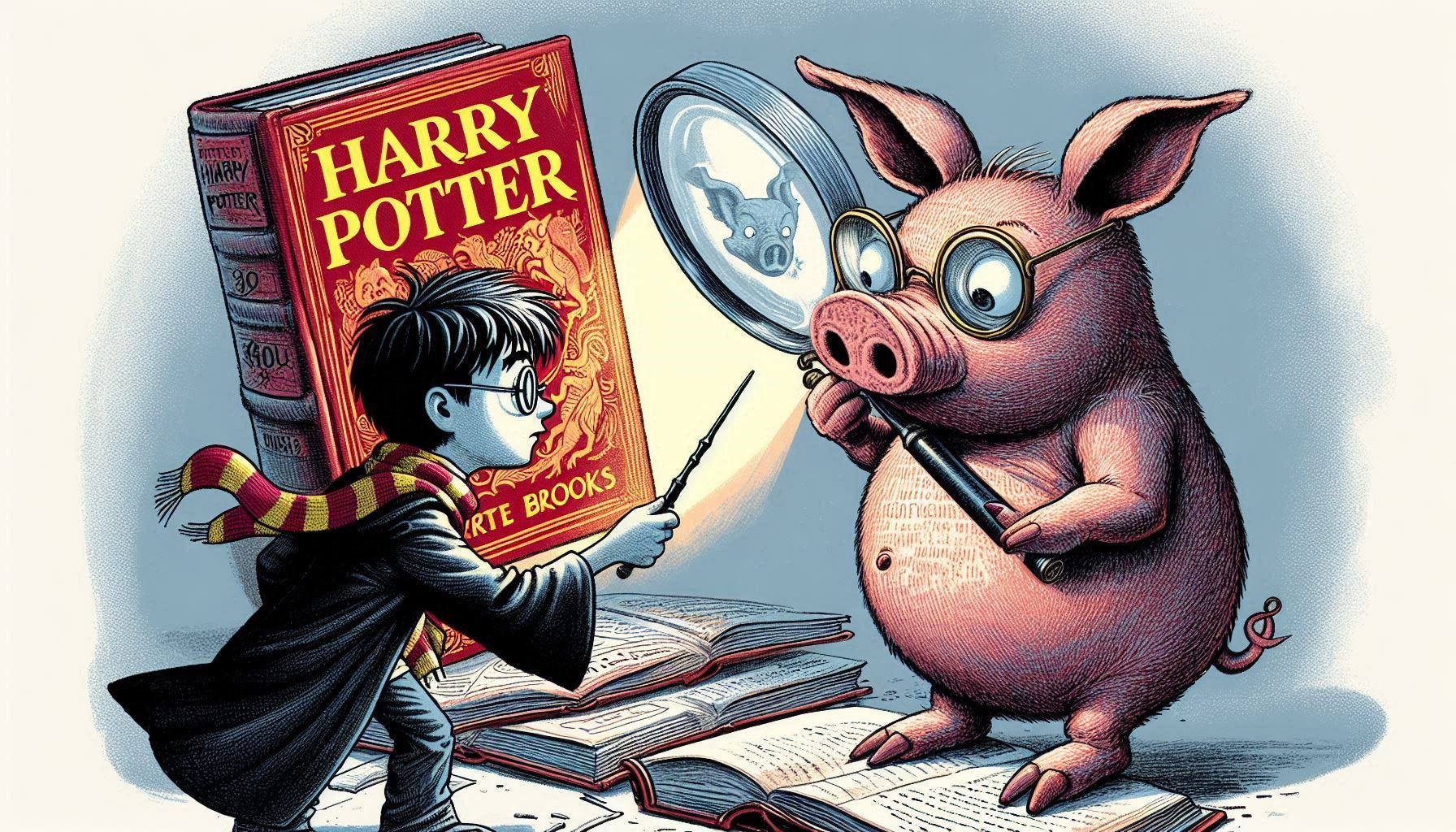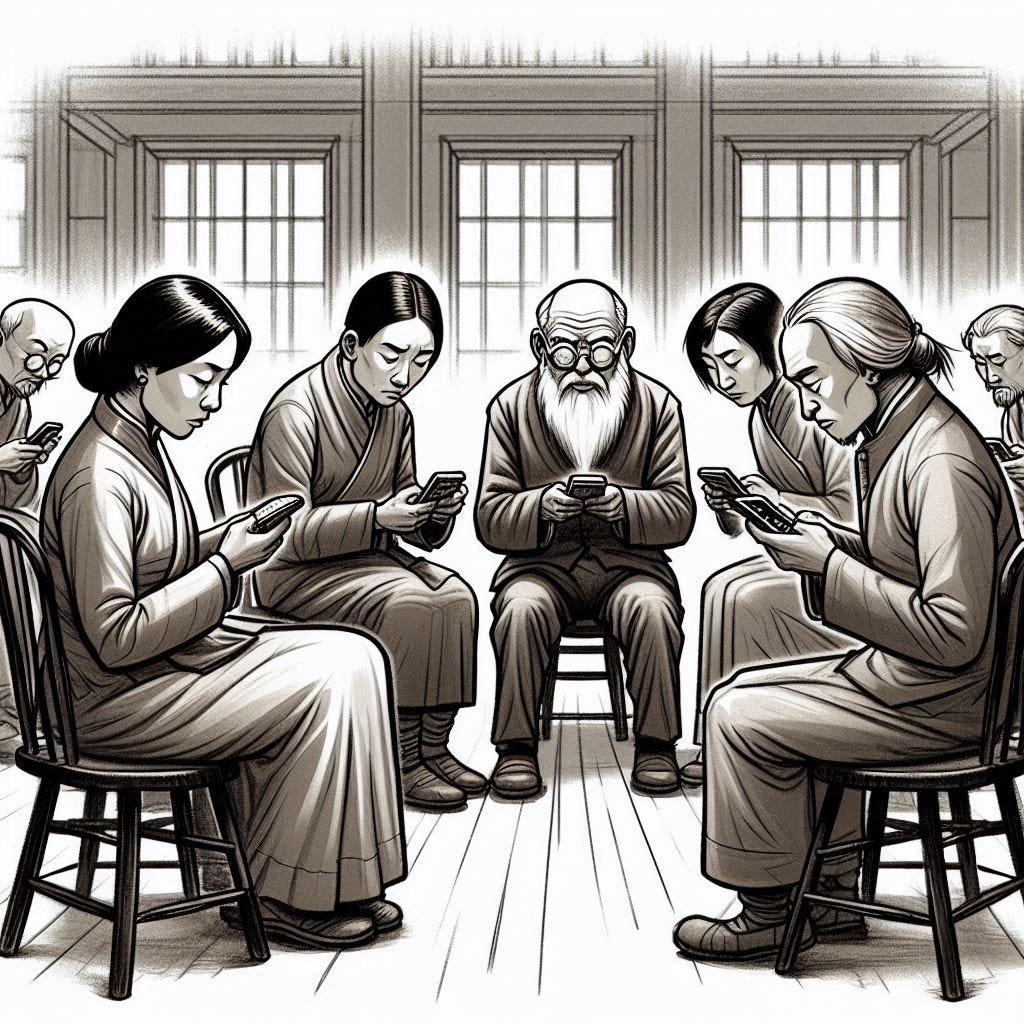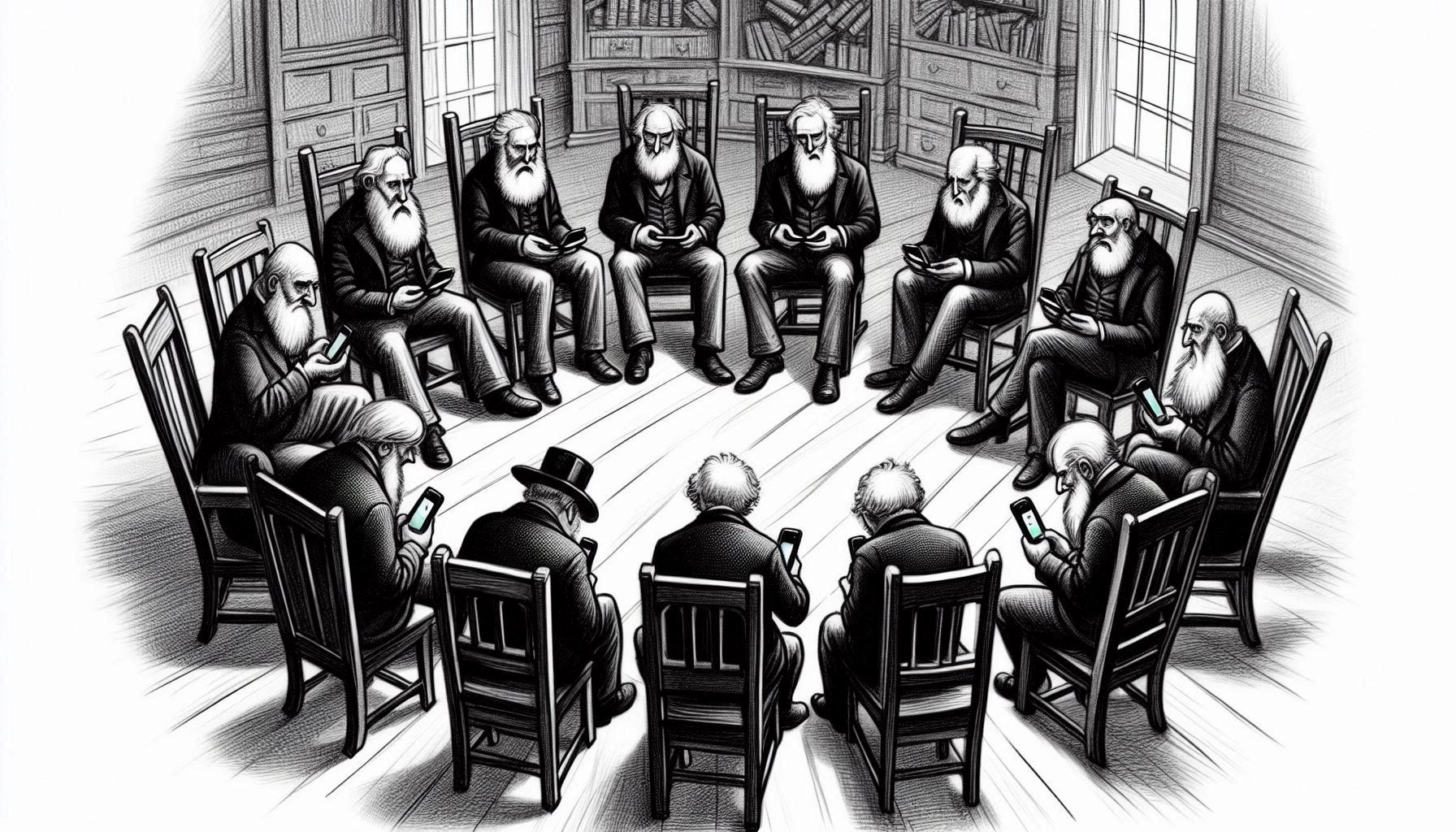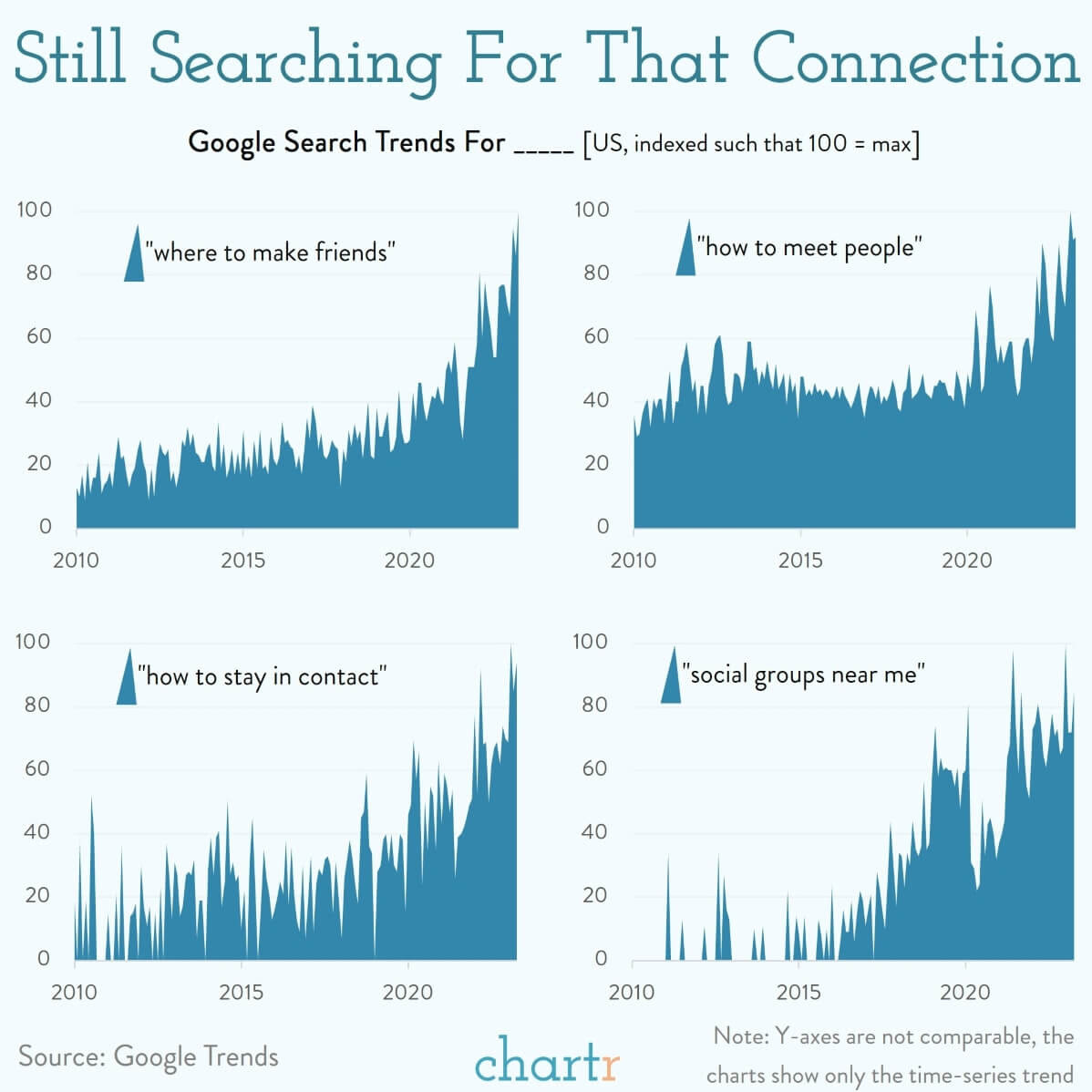Revenge of the Luddites—Part Two: In which a child learns to read
There is something to be said for indigenous cultures that never developed a written language.
When I was a child, my experience of reading began in the first grade. We would gather at a table and the teacher would put a picture book in front of us, and we would sound out the words that went with the pictures.
Before literacy, a child's world of language is ephemeral. Words float through the air. They are fleeting and intangible. Conversations are like soap bubbles, shimmering for a moment before popping, then gone.
As a pre-verbal child, I grasped at meanings, piecing together fragments of speech, facial expressions, and tone of voice to make sense of the swirling verbal soup. It was probably how a young dog tries to parse what I am trying to say to it.
When I learned to read, suddenly words had permanence. They were anchored to the page, patient and waiting. If I was curious, I could return to them again and again, savoring each syllable, pondering each phrase. No longer at the mercy of fleeting sounds, books become a trustee of ideas. They were always there to go back to. They were a constant.
Reading is a gateway to imagination. In conversation, meaning is negotiated between speakers, a collaborative act. But curled up with a book, a reader enters into an intimate communion with the author's mind. We conjure entire universes from black squiggles on white paper. Characters spring to life, more vivid than any real person.
Time and space bend to our will as we journey to distant lands and bygone eras with the turn of a page. We experience the thrill of inhabiting other perspectives, trying on new identities like costumes. Reading becomes a portal to infinite possibility.
In recent times, children have been drawn into reading by Harry Potter. When I was a child, it was Freddy the Pig. I devoured every book in the series. Children who read Freddy wanted to become detectives. Children who read Harry Potter want to be wizards. Books are like magnifying glasses or magic wands that way. They put awesome power into tiny hands.
Books for me were also liberating from the hierarchies of teacher-student and parent-child or older siblings. No longer merely a passive receiver of information, I could become an active seeker of knowledge. I could follow my curiosities, diving deeper into topics that fascinated me. A physical library in the 1950s—we had one within walking distance that I passed every day on the way to and from school—was not unlike hypertext links, Wikipedia, Google, or ChatGPT today. Books were buried gems waiting to be unearthed. Libraries were emerald fields.
And yet, there is something to be said for indigenous cultures that never developed a written language. For all its magic, reading can never fully replace the warmth and understanding of the human connection found in verbal exchanges. The printed word lacks the nuance of tone, the expressiveness of gesture, the depth of an eye-to-eye contact.
Verbal culture is also safer than writing.
In 2024, 78 percent of 18-to-29-year-old USAnians get their news from social media and 23 percent of those use mostly TikTok, followed by Instagram and X. Polls say 62 percent of that cohort will also occasionally scan news websites or print media, but fewer than 19 percent prefer news from conventional sources. Using TikTok for news is even higher in other countries—39 percent in Thailand and 36 percent in Kenya.
Social Media Platform | 2019 | 2024
----------------------|------|------
Facebook | 52% | 31%
YouTube | 28% | 29%
Instagram | 14% | 20%
TikTok | N/A | 23%
Twitter/X | 10% | 12%
Snapchat | 9% | 5%
Unmediated Social
Some might like to portray this as a clandestine plot emanating from Iran, Russia and China to destabilize the global order by creating social division and mayhem in the United States. In Nexus, Yuval Harari offers a simpler explanation. These platforms were optimized for engagement but then discovered that more engagement is generated by stimulating the limbic brain stem (our serpent brain with its fight-or-flight response), rather than the cerebral cortex (our higher reasoning centers). Harari writes:
By trial and error they learned that outrage creates engagement and without any explicit order from above, they decided to promote outrage. This is the hallmark of AI -- the ability of a machine to learn and act by itself. Even if we assign just 1 percent of the blame to the algorithms, [Myanmar] is still the first ethnic cleansing campaign in history that was partly the fault of decisions made by non-human intelligence.
***
We live cocooned by culture, experiencing reality through a cultural prism. Our political views are shaped by the reports of journalists and the opinions of friends. Our sexual habits are influenced by what we hear in fairy tales and see in movies. Even the way we walk and breathe is nudged by cultural traditions, such as the military discipline of soldiers and the meditative exercises of monks. Until very recently the cultural cocoon we lived in was woven by other humans. Going forward, it will be increasingly designed by computers.
***
These innovations will, in turn, influence the next generation of computers which will increasingly deviate from the original human models, especially because computers are free from the limitations that evolution and biochemistry impose on the human imagination.
Harari says that for millennia human beings have lived inside the dreams of other humans. In the coming decades we might find ourselves living inside the dreams of an AI intelligence. The Matrix proposed that to gain total control of human society, computers would have to first gain physical control of our brains, hooking them directly to a computer network. But to manipulate humans, there is no need to physically hook brains to computers, as I described last week from Dr. Bandy X. Lee’s work in prisons. Untreated derangement spreads virally.
How else could a deranged gangster narcissist grab and hold the allegiances of more than 70 million relatively well-educated people and get them to think Democrats control the path of hurricanes and Haitians are eating their pets?
Facebook doesn’t need to send Killer Robots to shoot us. It can manipulate our best friends to commit unspeakable acts of violence, from social shaming and ostracism to decapitation with a machete. Dr. Lee says you can think of a social virus, such as a personality cult or a disinformation campaign, as a dissociative state:
That means you are disconnected from your beliefs, your background, your own personality, your own agency, and that is very much what happens…. When you are infected by a severely mentally impaired person in a powerful position who has spread his symptoms through emotional bonds, the people who take on the symptoms come to look exactly like the primary individual. It's not that they have a psychosis or a personality disorder themselves, but as long as the exposure is in place they look identical and they will simply be echoes.
What we see is madness by the millions and that's what I've been trying to describe—a shared psychosis where the individuals themselves are not individually psychotic, but as a group, they act as if they were psychotic and detached from reality. And the more severe the symptoms, the more severe the shared psychosis the stronger the shared symptoms.
The cure for that is separation—removal of exposure.
That explains what happened in Myanmar, when Facebook unleashed a religious genocide that “destroyed hundreds of Rohingya villages, killed between 7,000 and 25,000 unarmed civilians, raped or sexually abused between 18,000 and 60,000 women and men, and brutally expelled about 730,000.” Could this explain the infectious madness of Trump? How else could a deranged gangster narcissist grab and hold the allegiances of more than 70 million relatively well-educated people and get them to think Democrats control the path of hurricanes and Haitians are eating their pets?
Populism, Explained
Ned Ludd may have been a fictional character but the Luddites were real. At one time, more British soldiers were fighting the Luddites than fighting Napoleon on the Iberian Peninsula. The protests from 1811 to 1817 were against new labor-saving milling machinery, but the real spark was the hardships suffered by the working class. The popular myth is that the Luddites tried to prevent the Industrial Revolution but they were more akin to the Yellow Vests, Extinction Rebellion, or the Coronation protesters in London.
In Deer Hunting With Jesus, Joe Bageant described the sense most working class USAnians feel towards how they have been used, abused, betrayed and duped. When they grasp for a Donald Trump, it is because they hear echos of their own feelings of victimization.
Every human experience in America is mediated for profit by a middleman or by a sparkling new pleasure technology. The process was accelerated half a century ago when television began to seize the intellectual world away from ordinary Americans. Now the pseudo-experience of television has shifted into cyberspace, but is the cyberworld's infinite and abstract universe expanding or contracting? Are we being freed, or crushed? We cannot know until it is too late.
Nor can we know, from within the hologram's many parallel universes and snow globes, about the global reality, much less class reality, unless we experience fleshly encounters with the other humans in our neighborhoods and communities. Now, more than ever, the middle class cannot see the working class and the working class cannot see past the next basketball playoffs.
True to the working-class-sports-culture-aesthetic, they remain spectators to politics, responding to each political play with emotion instead of reason, if they respond at all. Yes, I have written about unarticulated class anger, anxiety, and insecurity. But these are approximately happy people, thanks to the hologram. When happiness is based completely on the thinnest observable material conditions of life—a new truck in the driveway, an iPod in your pocket, the availability of Round-the-Clock entertainment—it's easy to be happy. When social conscience extends no farther than ourselves, our friends and our family, then Darfur or secret American prisons abroad are not a problem.
When we wake to a heartland newspaper that assures us that the most important thing going on today is the Winchester Kiwanis pancake breakfast and the County Supervisors debate about the height of a flagpole, the Supervisors' patreotic decision will doubtless be, high enough to cold cock a migrating Canadian goose. Because it's our nation's flag, by God.
And when we listen to the local talk radio host’s assurances that our country is whipping the bad guys and extending democracy worldwide, and at a profit to boot, but that we're going to need another 30,000 troops to finish the job, and that we live in the freest nation in the world, well, something resembling happiness pervades our lives.
Finding a Cure
In Nexus, Harari recalled Plato’s allegory of The Cave, in which a group of people are chained inside a cave all their lives, facing a blank wall—a screen. On that screen, they see projected various shadows. The prisoners mistake the illusions they see there for reality.
Social media does not employ a mounted overseer with a bullwhip. It does not require anyone to be physically tethered. It is seductively subtle. It just seeks your attention. You will be rewarded with a legal opiate.
The Luddite Club is an NYC-based group of teenagers “self-liberating” themselves from social media and phones. Their catchphrase is “Don’t be a phoney.” The more dedicated have exchanged their smartphones for flip phones. The group meets weekly in a public library or park to share time reading, drawing, writing, talking, meditating, or listening to music.
It is not easy. Neo-Luddite Natalie Deville writes:
I started trying to watch longer videos and movies, listen to music, and read more instead of compulsively scrolling, and always talked with my friends about “escaping the rabbit hole” that is social media. I noticed the change in my attention span and soon that wasn’t enough. I desperately wanted to delete my social media but felt its pull. I knew I would miss out on friends’ and artists’ posts.
Just as the Luddites worried about the impact of mechanization on their livelihoods and communities, modern social media fasters worry about the effects of constant connectivity on mental health, attention spans, and genuine human connection. The good news is that Facebook has seen a significant decline in news usage among 18-29 year olds. It fell from 52 percent in 2019 to 31 percent in 2024. Snapchat's usage for news has decreased from 9 percent to 5 percent.
The bad news is that most of that demographic shifted to even less reliable and more pernicious sources. The data shows a clear trend of younger audiences increasingly turning to ill-moderated social media platforms for their news. If you thought the Tea Party virus was bad, you had not yet seen MAGA. If you think the MAGA virus is bad, just wait until today’s 11 to 16-year-olds are old enough to vote.
Natalie Deville agrees with Harari that machines are gradually programming more and more of our experience of life and that they are well on the way of being in control:
If a social media site, or truly any modern digital company, had their way, they would completely control how you spent your time and money. Some may protest that the Luddites are not sound in their philosophy because many people need access to the internet for their safety/health and connection to both work and school. The personal dissociation they are advocating for doesn’t really bring social systems any closer to protecting individuals happiness, health, safety, or connection in the face of an ever more oppressively digital world.
To have happiness, health, safety, or genuine connection, we’ll have to practice disconnect.
References
Amnesty International, Myanmar: The social atrocity: Meta and the right to remedy for the Rohingya, September 29, 2022.
Crystal, Caroline, Facebook, Telegram, and the Ongoing Struggle Against Online Hate Speech, Carnegie Endowment for International Peace, September 7, 2023.
Deville, Natalie, How Luddite Teens of New York Changed My View of Social Media, Daily Good, June 15, 2024.
Klopfenstein Frei, Nadine, Valery Wyss, Aleksandra Gnach, and Wibke Weber. "“It’s a matter of age”: Four dimensions of youths’ news consumption." Journalism 25, no. 1 (2024): 100-121.
Media Insight Project, The news consumption habits of 16- to 40-year-olds (2022)
Pew Research Center, Social Media and News Fact Sheet, September 2024.
Statista, Leading social networks used for news in the U.S. 2019-2024.
Zaleznik, Daniel, Facebook and Genocide: How Facebook contributed to genocide in Myanmar and why it will not be held accountable, 2021. Harvard Law School Systemic Justice Program.

Meanwhile, let’s end these wars. We support peace in the West Bank and Gaza and the efforts to bring an immediate cessation to the war. Global Village Institute’s Peace Thru Permaculture initiative has sponsored the Green Kibbutz network in Israel and the Marda Permaculture Farm in the West Bank for over 30 years and will continue to do so, with your assistance. We aid Ukrainian families seeking refuge in ecovillages and permaculture farms along the Green Road and work to heal collective trauma everywhere through the Pocket Project. You can read all about it on the Global Village Institute website (GVIx.org). Thank you for your support.
Help me get my blog posted every week. All Patreon donations and Blogger, Substack and Medium subscriptions are needed and welcomed. You are how we make this happen. Your contributions can be made to Global Village Institute, a tax-deductible 501(c)(3) charity. PowerUp! donors on Patreon get an autographed book off each first press run. Please help if you can.
#RestorationGeneration.
當人類被關在籠内,地球持續美好,所以,給我們的教訓是:
人類毫不重要,空氣,土壤,天空和流水没有你們依然美好。
所以當你們走出籠子的時候,請記得你們是地球的客人,不是主人。
When humans are locked in a cage, the earth continues to be beautiful. Therefore, the lesson for us is: Human beings are not important. The air, soil, sky and water are still beautiful without you. So, when you step out of the cage, please remember that you are guests of the Earth, not its hosts.
We have a complete solution. We can restore whales to the ocean and bison to the plains. We can recover all the great old-growth forests. We possess the knowledge and tools to rebuild savannah and wetland ecosystems. It is not too late. All of these great works are recoverable. We can have a human population sized to harmonize, not destabilize. We can have an atmosphere that heats and cools just the right amount, is easy on our lungs and sweet to our nostrils with the scent of ten thousand flowers. All of that beckons. All of that is within reach.





